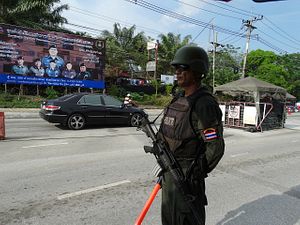With the presence of more than 150,000 military, police and armed civilian forces, life in the three provinces of Thailand’s Deep South – Pattani, Yala and Narathiwat – gives the impression of happening under occupation. Checkpoints cut the main arteries between and within cities, where military convoys on patrol whizz by civilian vehicles preceded by soldiers on motorbikes, who scout the area in advance for any suspicious items, such as improvised explosive devices (IEDs). Manned and unmanned checkpoints also dot the countryside in an attempt to hamper the insurgents’ movements. In Ruam Mit road, a busy commercial area in Yala city center, blast plinths line both sides of the street in order to minimize the impact of possible car bombs, which have already struck the area in the past with devastating consequences.
Babo Mohammed Ramli, the head of a pondok, or Koranic school, in Bra Ngan village in Yala province shared his views in no uncertain terms: “This is a jihad against the Thai state, but it has nothing to do with al-Qaeda.” To prove his point, he reads out in Arabic an excerpt from Imam al-Nawawi’s al-Majmu‘ sharḥ al-Muhadhdhab, a comprehensive manual of Islamic law according to the Shafi‘i school – one of the four main schools of jurisprudence in Sunni Islam to which the greatest majority of people in the Deep South adhere. “The basis for the relationship between Muslims and non-Muslims is peace and security, unless non-Muslims encroach on their rights, homes and properties. In that case, it is the individual duty of Muslims to fight jihad to ward off aggression.” He adds: “There is consensus among scholars about this, but no-one dares to speak out, for fear of the consequences.”
Yet despite the massive human cost of a decade of low-intensity conflict, the streets of the Deep South’s main cities are bustling with commerce and trade: markets are replete with goods; customers fill cafés and restaurants during the day and at night; and the ubiquitous motorbike-mounted food carts are patronized by young and old alike. Access to education remains unhindered with students flocking daily to schools and universities, although Thai remains the only official language of instruction – a major point of grievance for the majority Malay-speaking population.
Franco Galdini is a freelance journalist and analyst. Sulochana Peiris is a freelance documentary film maker and photographer.











































